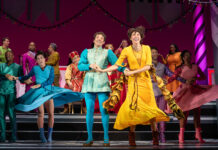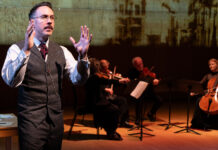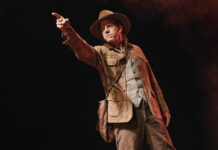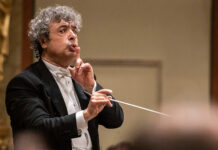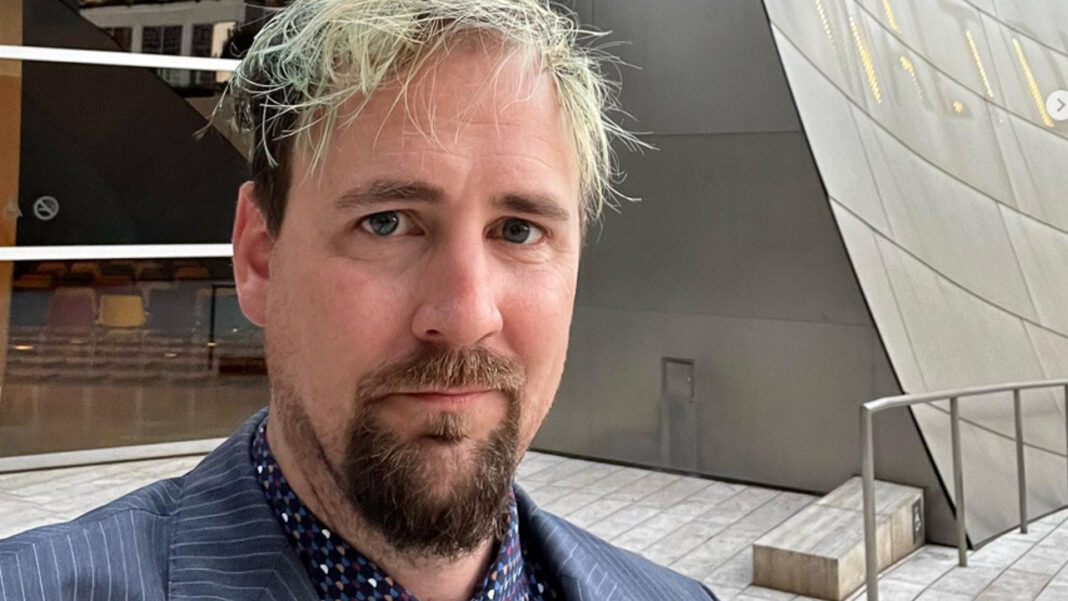If you listen to KUSC-FM, the classical music station based in Los Angeles, you are probably familiar with Brian Lauritzen. He’s the host of Sunday morning’s A Joyful Noise and anchors the afternoon commute into the early evening. He’s a staunch supporter of classical music and a strong advocate for the performing arts.
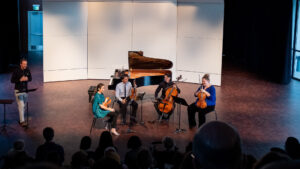
Which explains Lauritzen’s participation in this Sunday’s Music Box 2023 which is presented by Chamber Music LA at Zipper Hall at The Colburn School in downtown Los Angeles. The concert will showcase four different chamber music ensembles (Jacaranda Music, Los Angeles Chamber Orchestra, Colburn School’s Chamber Ensemble-In-Residence Quartet Integra and Salastina) performing string quartets written by Felix Mendelssohn, Wolfgang Amadeus Mozart, Arnold Schoenberg, Franz Schubert and a composer yet to be identified.
That last composer whose identity is being kept under wraps is where Lauritzen comes in. He has selected a piece of music and removed all details leaving it up to the musicians (Salastina’s Meredith Crawford, Kevin Kumar, Yoshida Masada and Maia Jasper White) and the audience to try to figure out who the composer is. This part of the program is called Sounds Mysterious.
Earlier this week I spoke with Lauritzen about his puzzle, Music Box 2023 and the start of the arts, not just in Los Angeles, but around the world. What follows are excerpts from our conversation that have been edited for length and clarity. To see the full interview, please go to our YouTube channel.
What excites you most about Music Box 2023 and and how do you think that excitement will translate to audiences who will be there?
The thing that really excites me about this particular program is that it’s about the string quartet, which is to chamber music, what the symphony is to orchestral music. It’s the pinnacle of what chamber music is. Every composer who tried to write seriously for chamber music wrote a string quartet. Generally you find in their string quartets some of their most serious, thoughtful, probing, artistic music within that structure. So to explore different styles of the string quartet, I think, is the thing that I’m most looking forward to.
Let’s take the Mozart, which opens the program. If all of four ensembles that are playing play that same Mozart, would a casual listener be able to discern a difference between how each one of them played that piece of music?
I love this question because it speaks to an element of virtuosity that is, I think, not talked about all that often. So what is virtuosity? We think about virtuosity as someone gets up in front of an audience and does something on a violin or a cello or whatever that seems humanly impossible. That’s one element of virtuosity. Another element of virtuosity is an interpretive element. This would be a cool thing for chamber music to do sometime is everybody plays the same piece. Then you can find out. I think even the casual listener would notice a difference and it might be something that you see, even if maybe they couldn’t put words on it.
What’s the criteria you use in selecting that that mystery piece of music?
I’ve done a couple of different options in the past [with Salastina] where I’m interested in both an unknown piece of music by a famous composer and a really awesome piece by an unknown composer. Those are the two extremes of the spectrum. I’m looking for music that structurally hangs together. I’m looking for music that we can hear it and we can identify things about this music that might give us a clue to what it is. I’m not really super trying to trip people up. I’m not trying to find a piece that makes you think it’s by someone and then it’s actually something else.
What do you feel the state of classical music is in Los Angeles right now?
I think it’s a vibrant scene. We’ve got our really wonderful large companies doing amazing things. And, of course, the Los Angeles Philharmonic is – just ask the New York Times – the most important orchestra in the United States. That’s not just because of Gustavo, although Gustavo is awesome. From the largest company in the city, all the way down to the smallest chamber music organization, we’ve got some of the best musicians on planet Earth here in Los Angeles.
We have to because of the dominant industry that runs this town – the film industry. The music that’s written for film and television demands greatness from the musicians and they deliver every single time. I’m in awe of the incredible artistry of the amazing musicians of this town. It comes down to the musicians. If the music making wasn’t great, then the organizations wouldn’t work out.
But, you know organizations of all sizes, whether it’s in Los Angeles or across the country and across the world, are having a hard time getting audiences to come back. Even one of the one of the ensembles that’s playing as part of Music Box, Jacaranda Music, is not going to be in existence at the end of this upcoming season. The million dollar question is what will it take to get audiences back? What will it take for people to embrace the collective experience of hearing music together?
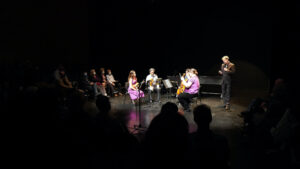
You’re right, it’s the million dollar question. It’s so sad. I’ve been a Jacaranda fan for as long as I’ve lived here in Los Angeles. I was just reading yesterday about the Philadelphia Orchestra musicians. They’ve authorized the strike for various reasons. Part of the reason that management has said we can’t raise your pay is that audience levels are at 64%. Before the pandemic they were at 75%. So something has to change to bring those audience levels back. You hit on a key component of it: community.
What did we miss the most when we were all at home isolating from one another? We missed that collective experience. The joy of getting in the same space together and experiencing music There’s great resources online and yes, we can watch anything that we want to watch and listen to anything that we want to listen to. But there’s that electric experience that you’re sharing this space with your friends and neighbors and people that you don’t know that you might get to know afterwards.
The other component for me is storytelling. Classical music is complicated. Classical music is complex. Classical music has a high entry point and I don’t believe that it should. Who I am in the world of classical music is someone who says you may think that it’s a difficult entry point, but here’s how it’s easy. Here’s how this thing that Beethoven did that we think is this grand and glorious thing – yes, it is this grand and glorious thing – but it also relates to what we experience everyday in our world. It’s a combination of reminding folks how incredibly joyful a concert experience is, and then, once they get there, giving them the context and relevance and the kind of emotional experience of what a classical music concert can be.
Since Schoenberg’s music is the penultimate work on this program and the first work is Mozart, I found this quote from him particularly appropriate. He said, “The way in which I write for string quartet, none can deny that I have learned this directly from Mozart.” We have a through line in this concert that is going to confirm Schoenberg’s quote. Looking forward, what do you think the through line will be? Schoenberg died in 1951, so he’s been gone for quite a while. What do you think the through line as a sequel to this would be, 25, 50 years in the future if we continued forward?
Classical music should always be looking forward. Classical music should always be creating something new while looking back to the past and not dishonoring the past. What do we love about the great composers in history? We love Beethoven because Beethoven changed everything. We love Mahler because Mahler said everyone’s done everything with symphonies except this thing. And then Mahler blew everything up and created symphonies that no one had created before. So classical music is at its best when it’s looking forward. When it’s looking to what hasn’t been done yet, while still recognizing that there is this rich tradition and history. That as a composer or a musician you’re part of this thing that’s bigger than yourself.
To watch the full interview with Brian Lauritzen, please go here.
Main Photo: Brian Lauritzen (Courtesy Brian Lauritzen)


